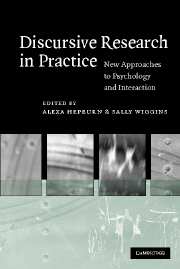Book contents
- Frontmatter
- Contents
- List of figures
- List of contributors
- Acknowledgements
- 1 Discursive research: themes and debates
- Part I Psychology in action
- Part II Professionals and clients
- 7 When patients present serious health conditions as unlikely: managing potentially conflicting issues and constraints
- 8 Arguing and thinking errors: cognitive distortion as a members' category in sex offender group therapy talk
- 9 Members' and analysts' interests: ‘formulations’ in psychotherapy
- 10 ‘Suppose it wasn't possible for you to go any further with treatment, what would you do?’ Hypothetical questions in interactions between psychiatrists and transsexual patients
- Part III Youth and institutions
- Appendix: transcription notation
- References
- Index
9 - Members' and analysts' interests: ‘formulations’ in psychotherapy
Published online by Cambridge University Press: 04 November 2009
- Frontmatter
- Contents
- List of figures
- List of contributors
- Acknowledgements
- 1 Discursive research: themes and debates
- Part I Psychology in action
- Part II Professionals and clients
- 7 When patients present serious health conditions as unlikely: managing potentially conflicting issues and constraints
- 8 Arguing and thinking errors: cognitive distortion as a members' category in sex offender group therapy talk
- 9 Members' and analysts' interests: ‘formulations’ in psychotherapy
- 10 ‘Suppose it wasn't possible for you to go any further with treatment, what would you do?’ Hypothetical questions in interactions between psychiatrists and transsexual patients
- Part III Youth and institutions
- Appendix: transcription notation
- References
- Index
Summary
Discursive psychology's interests in respecifying the traditional phenomena of psychology is well exemplified, we think, in the way that conversation analysis (which is a mainstay of discursive psychology) can illuminate psychotherapy. This chapter is about two things: what conversation analysis has to say about psychotherapy as an interaction, and what it has to say about psychotherapy as psychotherapy. We want to see what we can say about what therapists are up to: how they achieve what seem (to us) to be their therapeutic objectives.
In looking at therapy that way, we are in what is sometimes called ‘applied CA’. That is to say, we are certainly going to be looking very closely at the exact exchange of talk, and relying on the accumulated insights of CA to see how it works. But, unlike the utterly unmotivated looking of ‘basic’ CA, we do have our eyes open to the institutional work that the talk is likely to be carrying out. Moreover, we are conscious that, in therapy talk, we have something about which institutional representatives themselves have stories to tell: what Peräkylä and Vehviläinen call ‘stocks of interactional knowledge’ (Peräkylä and Vehviläinen (2003). In these circumstances, a CA account can be corrective (it may prove the therapists' account wrong, even on their own terms), or it might be illuminating (it might show they are right, and provide detail), or it might reveal something unsuspected but meaningful to the therapists (again, in their own terms; we leave aside those things that CA reveals about the interaction as an interaction as such, and in which a therapist would have no special interest).
- Type
- Chapter
- Information
- Discursive Research in PracticeNew Approaches to Psychology and Interaction, pp. 166 - 181Publisher: Cambridge University PressPrint publication year: 2007
- 10
- Cited by

